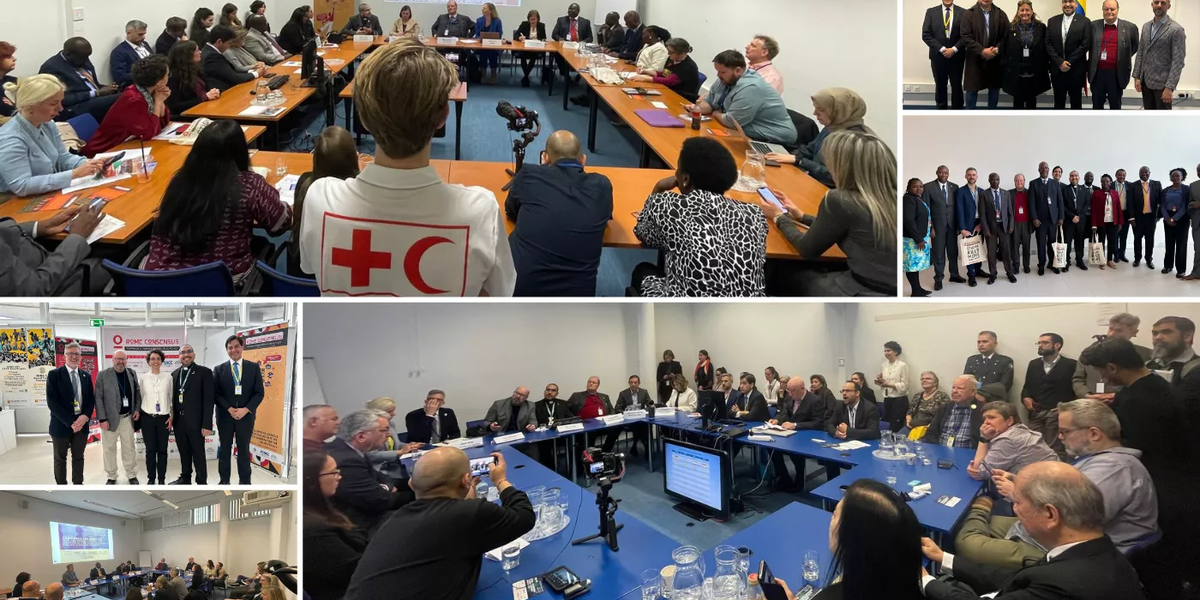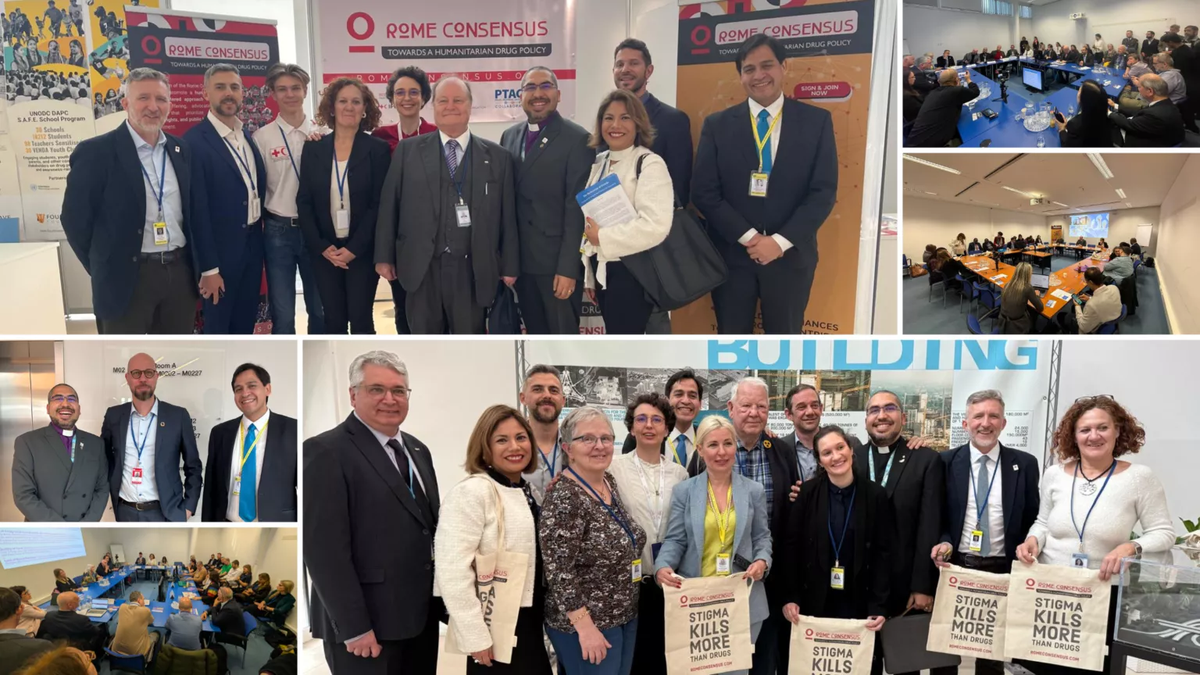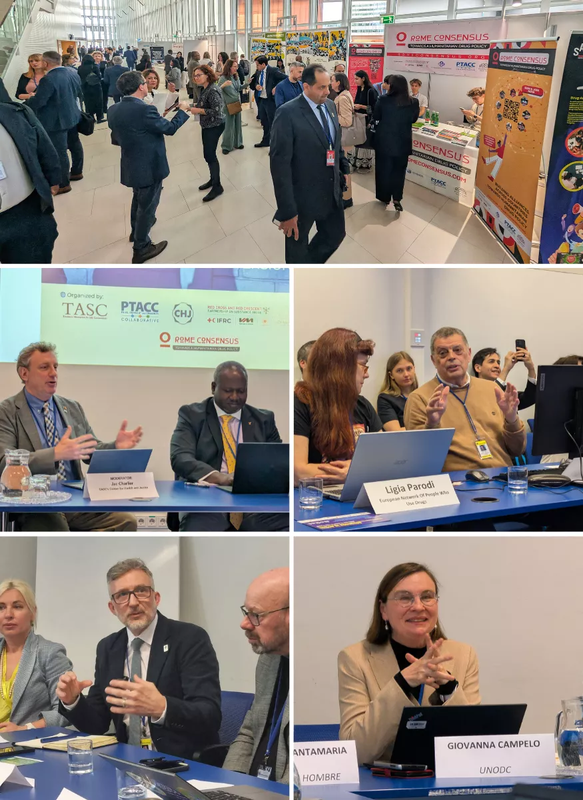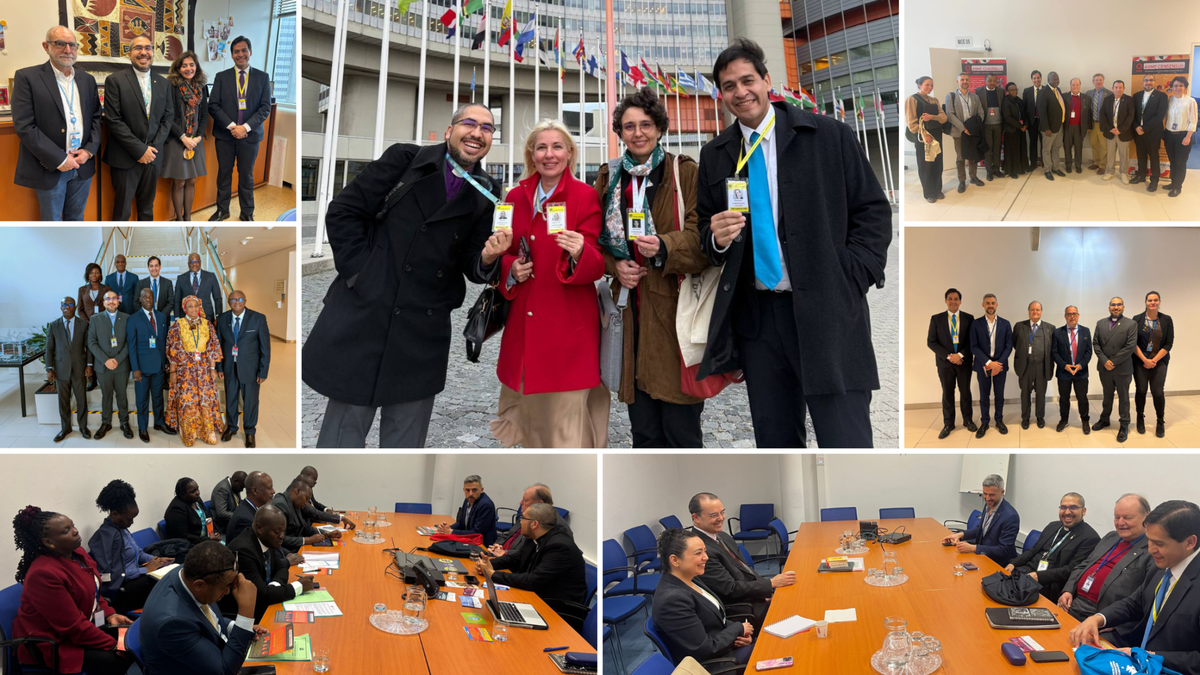
68th session of the United Nations Commission on Narcotic Drugs (CND 68)
The 68th session of the United Nations Commission on Narcotic Drugs (CND 68) gathered more than 2,000 representatives from over 100 Member States, international organizations, civil society groups, and drug policy experts. Over five days, discussions centered on substance control, the synthetic drug crisis, and the need for a balanced approach between security and public health.
Since CND 62, the Knowmad Institut has actively participated in this forum, advocating for a drug policy framework rooted in human rights, public health, and scientific evidence. As a committed member of the Rome Consensus 2.0 network since 2020, the institute strengthened strategic alliances and contributed to the global debate on more humanitarian approaches to drug policy during CND 68.

During CND 68, six key resolutions were approved, focusing on prevention, treatment, security, substance control, and sustainable development. Chile and Colombia spearheaded major initiatives with global impact.
- Chile led efforts on child and adolescent drug use prevention (E/CN.7/2025/L.2/Rev.1), reinforcing evidence-based strategies. However, its success will depend on adequate funding and accessibility in vulnerable communities.
- Colombia proposed modernizing the drug control system (E/CN.7/2025/L.6/Rev.1), establishing an expert panel to update international treaties. While a step forward, there is still a need for better technological integration and transparency in implementation.
Additionally, resolutions were adopted on:
- Stimulant treatment (USA) – Promoting research and access to therapies.
- Alternative development (Germany, Peru, Thailand) – Supporting sustainable economies in regions affected by illicit drug production.
- Security in clandestine laboratories (Mexico, Poland, Albania) – Protecting emergency response teams.
- Environmental impact of drug trafficking (Brazil, France, Morocco, Albania) – Integrating sustainability principles into drug policies.

Throughout CND 68, the Knowmad Institut played a key role in promoting humanitarian and evidence-based drug policies. Through its work with Rome Consensus 2.0, the institute strengthened partnerships and contributed to the global discussion.
Key Achievements:
- 7 side events organized and co-organized, addressing prevention, harm reduction, universal healthcare access, public safety, public health, open science, emerging technologies, and treatment accessibility.
- 7 bilateral meetings with government delegations from Colombia, Guatemala, Argentina, Mexico, Finland, Côte d’Ivoire, and Kenya, focusing on cooperation in public health and human rights.
- 2 meetings with UNODC (WhatsOn & Research Unit) to enhance collaboration on open data access and policy analysis.
- 1 meeting with INTERPOL, exploring mechanisms to improve traceability and cybersecurity in substance control.
- 3 events led directly with Rome Consensus 2.0 partners, reinforcing the commitment to evidence-based policies.
- 1 Rome Consensus 2.0 stand for 5 days, promoting dialogue on humanitarian drug policies.
- Expansion of the Global Review on Humanitarian Drug Policies, with new countries joining efforts to monitor drug policy impacts.
These efforts highlight the need for a comprehensive and balanced international drug policy that prioritizes security, public health, and sustainable development.
The Knowmad Institut organized, co-organized, and co-hosted seven side events, covering topics such as essential medicine access, harm reduction, and human rights-based drug policies.
EventoAsistenciaInnovations in the Continuity of Care, Solutions Over Ideologies Organized by IFNGO – International Federation of Non-Government Organisations for the Prevention of Drug and Substance Abuse, and co-hosted by:
- República Portuguesa
- National Narcotics Control Commission (China)
- C4 Recovery Foundation
- Knowmad Institut
- Fondazione Villa Maraini – Croce Rossa Italiana
- Vienna NGO Committee on Drugs
- Asociaciòn Proyecto Hombre
- Ares do Pinhal (Portugal)
- WFTC – World Federation of Therapeutic Communities
- World Federation Against Drugs
- Drug Free America Foundation, Inc.
- Green Crescent
- ARTM – Associação de Reabilitação de Toxicodependentes de Macau / Association of Rehabilitation of Drug Abusers of Macau
40 personsImproving Equitable Global Availability and Affordability of Internationally Controlled Essential Medicines in Africa Through Inter-Agency, Member State, and Civil Society Collaborations
Organized by the International Association for Hospice and Palliative Care and co-hosted by:
- Belgium
- Ghana
- South Africa
- UNODC Prevention, Treatment and Rehabilitation Section
- International Narcotics Control Board
- Eastern and Southern Africa Commission on Drugs
- C4 Recovery Foundation
- Knowmad Institut
- Global Initiative Against Transnational Organised Crime
- African Palliative Care Association
- Vienna NGO Committee on Drugs
- Misión Sacerdotal
- Red Cross and Red Crescent Partnership on Substance Abuse
30 personsA Humanitarian Approach to Addressing Synthetic Drugs Threats
Organized by the Elternkreis Wien and co-hosted by:
- Colombo Plan
- Pompidou Group of the Council of Europe
- Knowmad Institut
- Villa Maraini Foundation
- C4 Recovery Foundation
- Observatorio Humanitario de Cruz Roja Argentina
- Universidad del Rosario
- Proyecto Hombre
- Federación brasileña de comunidades terapéuticas
- Federación latinoamericana de comunidades terapéuticas
- World Federation of Terapeutic communities
- Police, Treatment and Community Collective
- Treatment Alternatives for Safe Communities
- Drug Policy Network South East Europe
- CRANSTOUN
- Misión Sacerdotal, sva
- Association of Rehabilitation of Drug Abusers of Macau
- REDUC
44 personsCan It Really Be Done? Yes! How Low-Income Countries Can Successfully Implement Treatment for Deflection and Diversion
Organized by TASC, and co-hosted by:
- C4 Recovery Foundation
- CHJ
- Knowmad Institut
- Villa Maraini Foundation
- PTACC
28 personsDrug Policy, Extractivist Industries and Human Rights in Latin America and Caribbean
Organized by the Rede Brasileira de Redução de Danos e Direitos Humanos, and co-hosted by:
- Drug Policy Reform and Environmental Justice International Coalition
- Fundação Oswaldo Cruz
- Conectas Direitos Humanos
- Centro de Convivência É de Lei
- Law Enforcement Action Partnership
- Plataforma Brasileira de Política de Drogas
- Iniciativa Negra por Uma Nova Política sobre Drogas
- Knowmad Institut
- Washington Office on Latin America
- Intercambios AC
24 personsAdvocacy in Action: Advancing Comprehensive Health and Harm Reduction Services
Organized by theDrug Policy Network South East Europe, and co-hosted by:
- Czechia
2. Pompidou Group of the Council of Europe
3. International Cooperation Group on Drugs and Addictions
4. UNITE Parliamentarians Network for Global Health
5. European Harm Reduction Network
6. Eurasian Harm Reduction Association
7. European Network Of People Who Use Drugs
8. Re Generation
9. Villa Maraini
10. Barcelona Institute for Global Health
11. Fondazione LILA Milano
12. Asociación Bienestar y Desarrollo
13. Free Clinic vzw
14. Spolecnost Podane ruce
15. Knowmad Institut
35 personsClarifying Harm Reduction: A Return to Public Health and Global Well-Being
Organized by the International Federation of the Red Cross and Red Crescent Societies, and co-hosted by:
- Kenya,
- Mexico,
- UNODC Prevention, Treatment and Rehabilitation Section,
- the Pompidou Group of the Council of Europe,
- Argentinian Red Cross,
- C4 Recovery Foundation,
- Knowmad Institut,
- Villa Maraini Foundation,
- Treatment Alternatives for Safe Communities,
- Drug Policy Network South East Europe,
- Police, treatment and community,
- Rede Brasileira de Redução de Danos,
- Middle East HR Association,
- Universidad del Rosario (Colombia),
- International Association for Hospice and Palliative Care,
- CRANSTOUN,
- ARTM -Association of Rehabilitation of Drug Abusers Macau
- Ares do Pinhal (Portugal)

CND 68 showcased significant progress in integrating public health and human rights approaches into drug policy. However, critical challenges remain that require immediate action and adequate resources to ensure real impact.
Progress: Greater recognition of harm reduction and public health in the adopted resolutions, alongside a growing interest in alternatives to criminalization.
Structural Challenges:
- Citizen participation and transparency – Civil society inclusion is key to evaluating policy effectiveness and accountability.
- Cybersecurity and traceability – Digital systems must be improved to prevent the diversion of controlled substances into illicit markets.
- OSINT techniques and Early Warning Systems – Open-source intelligence tools are needed to anticipate trafficking trends and enhance enforcement.
- Food security – The impact of drug trafficking on essential crops and rural economic stability remains unaddressed.
- UNODC budget crisis – Without adequate funding, resolution implementation remains at risk, especially in the Global South.
Looking Ahead: To ensure real impact, States must allocate budgets, strengthen international cooperation, and promote technological innovation in drug control and policy monitoring.
CND 68 demonstrated progress in recognizing health- and human rights-based approaches, yet structural challenges persist.
The Knowmad Institut will continue promoting these principles internationally, advocating for a more humane, effective, and sustainable drug policy.
📢 Let’s keep moving forward together toward a world where drug policies respect and protect life! 🚀